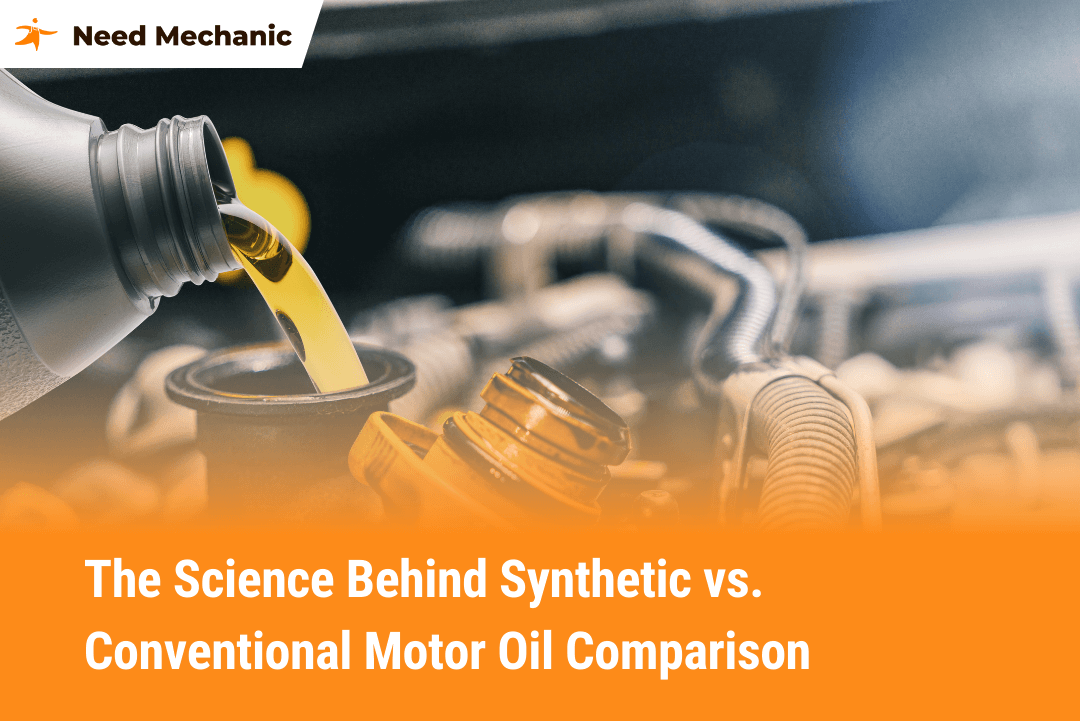When it comes to taking care of your car’s engine, one decision many drivers face is whether to use synthetic or conventional motor oil. This choice impacts more than just oil changes, it affects performance, fuel economy, engine longevity, and long-term costs. In this in-depth article, we’ll break down the science behind synthetic vs. conventional motor oil in a way anyone can understand, even if you’re not a car expert. We’ll explain what each type is made of, how they behave in your engine, the pros and cons of both, and which one is right for your driving needs. Our focus is on real-world benefits for you, not just technical specs. Let’s get started.
Table of Contents
- What Is Motor Oil and Why Does It Matter?
- What Is Conventional Motor Oil?
- What Is Synthetic Motor Oil?
- Key Differences: Synthetic vs. Conventional
- Performance in Extreme Temperatures
- Engine Protection and Wear Reduction
- Fuel Economy: Does Oil Choice Affect MPG?
- How Often Should You Change Oil?
- Cost Comparison: Upfront vs. Long-Term Savings
- When to Choose Synthetic Oil
- When Conventional Oil Makes Sense
- The Role of Synthetic Blends
- Common Myths About Motor Oil
- User Scenarios: Which Oil Is Right for You?
- Final Thoughts: Making the Best Choice
- FAQs
What Is Motor Oil and Why Does It Matter?
Motor oil is the lifeblood of your engine. Its main jobs are:
- Lubricating moving parts
- Reducing friction and wear
- Cooling engine components
- Cleaning away sludge and debris
- Protecting against corrosion
Without oil, your engine would quickly overheat and fail. But not all oils perform the same. The type you choose affects how well your engine runs, especially over time.
What Is Conventional Motor Oil?
Conventional motor oil is made from refined crude oil, a naturally occurring substance pulled from the earth. It contains:
- Base oils (from crude)
- Additives to improve performance (like detergents, anti-wear agents)
It’s the most traditional form of engine oil, used in cars for decades.
Pros:
- Cheaper upfront
- Widely available
- Works well for older engines
Cons:
- Breaks down faster under heat
- More frequent oil changes
- Less protection under stress
Conventional oil is basically filtered and processed crude oil with some chemicals mixed in to help it perform better.
What Is Synthetic Motor Oil?
Synthetic oil is man-made in labs using chemical compounds designed to offer better performance and protection. It’s built molecule by molecule, making it more consistent and pure.
What’s inside:
- Custom-designed base oils (not just refined crude)
- High-tech additives for better wear protection
- Friction modifiers to improve engine efficiency
Pros:
- Handles extreme temperatures better
- Reduces engine wear
- Lasts longer (up to 10,000+ miles per change)
- Improves fuel efficiency
- Keeps engine cleaner
Cons:
- Costs more upfront
- Not always needed for basic vehicles
Synthetic oil is ideal for people who want better engine protection, longer oil change intervals, and enhanced performance.
Key Differences: Synthetic vs. Conventional
| Feature | Conventional Oil | Synthetic Oil |
|---|---|---|
| Source | Refined crude oil | Chemically engineered |
| Engine protection | Basic | Advanced |
| Oil change interval | 3,000–5,000 miles | 7,500–15,000 miles |
| Resistance to breakdown | Lower | Higher |
| Performance in cold/heat | Fair | Excellent |
| Price per quart | $4–$6 | $8–$12+ |
| Fuel efficiency support | Minimal | Noticeable improvement |
Performance in Extreme Temperatures
Cold mornings or hot summer drives can test your oil’s limits.
- Conventional oil thickens in cold weather, making it harder for your engine to start.
- Synthetic oil flows easily even when it’s freezing, reducing startup wear.
- In high heat (like driving in traffic or towing), synthetic holds its viscosity better, preventing breakdown.
If you live in areas with extreme temperatures, synthetic is usually the smarter choice.
Engine Protection and Wear Reduction
Every time you drive, engine parts grind against each other at thousands of RPMs.
- Synthetic oil forms a stronger film, preventing metal-on-metal contact.
- It also contains fewer impurities, which means less buildup of sludge and deposits.
- Over time, engines using synthetic oil stay cleaner and suffer less wear.
If you plan to keep your car for the long haul or just want peace of mind – synthetic wins on engine protection.
Fuel Economy: Does Oil Choice Affect MPG?
Yes, it does—though the gains are moderate.
- Synthetic oil reduces friction, allowing your engine to run smoother.
- This can result in up to 2% better fuel economy depending on your driving style and vehicle.
- While it won’t double your MPG, over the course of a year, it can save you gas money.
For high-mileage drivers, this small edge adds up.
How Often Should You Change Oil?
Changing your oil on time keeps your engine healthy. Here’s how frequency differs:
- Conventional oil: Change every 3,000 to 5,000 miles
- Synthetic oil: Change every 7,500 to 15,000 miles
Factors that affect timing:
- Driving habits (short trips vs. highway)
- Environment (dusty areas, high heat)
- Vehicle age and model
Always check your owner’s manual, but if you’re unsure, synthetic gives you a longer cushion between changes.
Cost Comparison: Upfront vs. Long-Term Savings
Yes, synthetic costs more, but it’s not the full story.
Upfront:
- Conventional oil change: $30–$50
- Synthetic oil change: $60–$90
Long-term:
- Fewer oil changes per year
- Better fuel economy
- Less engine wear = fewer repairs
For people who drive often or keep their car beyond 100,000 miles, synthetic oil can actually save money over time.
When to Choose Synthetic Oil
Choose synthetic oil if:
- You live in very hot or cold areas
- You drive a high-performance or luxury vehicle
- You tow trailers or carry heavy loads
- You want longer intervals between oil changes
- You care about maximum engine protection
It’s perfect for people who want to protect their investment.
When Conventional Oil Makes Sense
Choose conventional oil if:
- You drive an older car without performance needs
- You’re on a tight budget and change oil frequently
- You do short, low-mileage trips
It still works fine, but requires more frequent maintenance.
The Role of Synthetic Blends
Not ready to go full synthetic? Try a synthetic blend.
- Mixes synthetic and conventional oils
- Offers better protection than conventional
- Costs less than full synthetic
Great for drivers looking for a middle ground.
Common Myths About Motor Oil
Myth 1: You can’t switch back and forth.
Truth: Totally fine to switch between synthetic and conventional.
Myth 2: Synthetic oil causes leaks.
Truth: Only if your engine already has bad seals, it doesn’t create leaks.
Myth 3: High-mileage engines can’t use synthetic.
Truth: Many synthetic oils are designed for high-mileage engines and offer extra additives.
Don’t let myths guide your choice, focus on facts and what your engine really needs.
User Scenarios: Which Oil Is Right for You?
1. Daily commuter in a hot climate (e.g., Texas)
→ Synthetic: Handles heat better, fewer oil changes
2. Older car with over 150,000 miles
→ Conventional or High-Mileage Synthetic Blend
3. New car under warranty
→ Check manufacturer requirement often synthetic is recommended
4. Budget-conscious driver who changes oil often
→ Conventional
5. Weekend sports car or truck that tows
→ Full Synthetic
Final Thoughts: Making the Best Choice
The science behind synthetic vs. conventional motor oil isn’t just for mechanics—it affects your wallet, your car’s performance, and how long your vehicle will last.
Here’s the bottom line:
- Synthetic oil = better performance, protection, and efficiency.
- Conventional oil = lower cost but more maintenance.
- Synthetic blend = a balanced option.
If you care about engine health, drive in extreme weather, or just want fewer trips to the mechanic, synthetic oil is worth it. But if your car is older, you drive less, or you’re watching every dollar, conventional oil still does the job with more frequent attention.
In the end, the best oil is the one that fits your driving style, climate, and long-term plans for your vehicle. Make an informed choice, and your engine will thank you with years of smooth, trouble-free performance.
FAQs
Is synthetic oil better than conventional oil for engine life?
Yes, synthetic oil gives better protection, lasts longer, and helps reduce engine wear over time, especially in extreme heat, cold, or heavy traffic.
Can you switch from conventional to synthetic oil safely?
Yes, switching is safe. Just make sure to do a complete oil change and use synthetic oil that matches your car’s required specifications.
How often change synthetic oil vs conventional oil?
Synthetic oil lasts 7,500–15,000 miles, while conventional needs changing every 3,000–5,000 miles. Your driving habits and car manual help decide the right time.
Does synthetic oil improve fuel economy?
Yes, synthetic oil helps reduce engine friction, which can improve fuel economy by a few percent, especially during long drives or extreme temperatures.
Is synthetic oil worth extra cost vs conventional?
Even though synthetic oil costs more, it saves money over time with fewer oil changes, better engine protection, and improved fuel efficiency.
Does synthetic oil help in cold weather starts?
Synthetic oil flows better in freezing weather, protecting your engine during startup when conventional oil gets too thick and causes wear.
Can older engines use synthetic oil without problems?
Most older engines can safely use synthetic oil. Many synthetic types are made for high-mileage vehicles and help reduce leaks and sludge.
What is better: full synthetic, blend, or conventional?
Full synthetic offers top protection and lasts longest. Synthetic blends are more affordable. Conventional is okay for older or low-mileage cars.













Leave a Reply